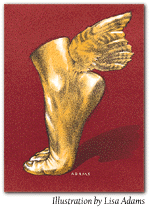Main Menu · Search ·Current Issue ·Contact ·Archives ·Centennial ·Letters to the Editor ·FAQs
| Unbounded Aspirations | Films: The West |
| Music: Trout, Enjoying Opera | Chapter & Verse |
| Off the Shelf | Open Book |

"Not given to boasting-my father saw to that-I never mention in
social situations the books I have published, the prizes and honors I have
won, but I do not hesitate to state that I am a Harvard man. This seems
to me as basic as stating that I was born in New York City." So writes
James Thomas Flexner '29 at the start of the "Harvard" chapter
in Maverick's Progress: An Autobiography (Fordham University Press,
$29.95). Flexner went on to become a biographer of George Washington and
the author of many books on the history of American art and civilization,
but in his freshman year, he was also a man of wingèd foot.
Participation in organized athletics was required of all freshmen. When
I informed the track coach that I had been the best sprinter in my high
school, he looked at my short legs, smiled, and assigned me to cross-country.
Not relishing the prospect of grinding along mile after mile, I rebelliously
entered myself in the dash at the all-college "Fall Handicaps."
Again smiling at my legs, the coach gave me a considerable handicap. No
other runner, not even the great Al Miller, passed me. I was given a gold
medal featuring a wingèd foot, and had my picture in a Boston newspaper.
I have always particularly relished achievement outside my usual beat. I
dearly loved that gold medal. However, when I showed it to my best girl
she could not have been less interested. Thus, I began my long, long experience
in the futility of trying to impress artistic women with nonartistic achievements.
Enrolled in the freshman track team, I...spent one of the most amusing afternoons
of my life at the pep talk we were given before our contest with the Yale
freshmen.
The problem to be overcome by our head coach, Eddie Farrell, was that in
published statistics in newspapers-speed for runners, height for jumpers,
distance for hammer throwers-we were outclassed. After each specialty coach
had finished his instructions, Farrell commanded him out of the room, slamming
and locking the door behind him. When finally we were alone with him, he
leapt to his feet in a fury, shouting that we were "yellow," a
bunch of cowards afraid we would be beaten because of a lot of damn fool
figures. He ticked each of us off one by one. Then he became sentimental.
There wasn't an American boy who would not be proud to be in our shoes tomorrow.
Ten thousand men of Harvard would be running or throwing behind us. The
freshman sitting next to me said that he could feel the presence of those
ten thousand Harvard men.
P.S. We were clobbered.
This was the end of my athletic career. I preferred the Harvard Dramatic
Club, which made me break "training" by staying up late at night.
True, I entered ignominiously as a member of the properties department.
Furthermore, I was not allowed, when my turn came, to manage this aspect
of the production because of the rule (I do not remember how that was explained
to me) that, although Jews might be members, they were forbidden positions
from which they could admit further Jews.
I remember best what was the first production in America of James Elroy
Flecker's poetic play Hassan, from which I had memorized passages
in high school. Laid in Istanbul, it was replete with romance, lust, and
cruelty. I was allowed to play the keeper of the gate. As the curtain rose
on the first act, I stood alone on the stage wearing only a skimpy loincloth.
The audience burst into applause. I was as amazed as I was pleased. I had
not realized that I had so impressive a physique. But, after a euphoric
moment, I realized that they were in fact applauding the scenery.